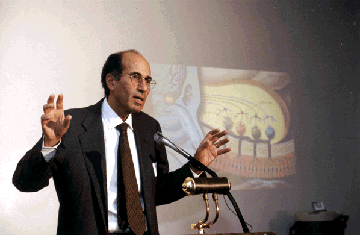Prof. Chachanover reinforces Prof. Axel's words and tells the site of knowledge: Limiting human curiosity will be the end of the road
By: Avi Blizovsky, Stockholm

Before the traditional dinner ended and the Nobel Prize winners together with the 1,300 guests of the banquet went up to the ballroom and the ball went into the night, four representatives - a representative from each of the prizes gave a short speech in which the things that were most important to them to say (this year the Nobel Prize winner for literature Alfreda Yelink did not participate in the ceremony and also did not send a written speech).
The series was opened by Dr. Richard Axel, who together with his colleague Dr. Linda Beck won the Nobel Prize for Medicine, for discovering the mechanism of smell through collaboration between completely different medical disciplines. It turns out that not only the science site is concerned about the deterioration of the attitude to science in Israel, but also in the US for religious or other pseudo-scientific reasons. He did not elaborate, but it is enough if we mention the almost sweeping opposition in the UN to human cloning and the silence that currently exists in Israel on the Council for Bioethics only because it has members, mainly scientists who support human cloning when it reaches a sufficient level of safety and want to ban it completely at all costs. An older threat is from the creationists on biology studies, resulting in damage to the education of a new generation of scientists, and more and more.
"Emile Zola was once asked in a lecture to students at the end of the 19th century, 'Does science guarantee happiness?', 'No, I don't think so,' he replied. "Science promises truth and the question is whether the truth will ever make us happy" Last month science made me happy. Tonight Linda Buck and myself received a medal with the three words Crevit et Promovit engraved on it. He created and he promoted. These words do not glorify us. They praise the vision of Alfred Nobel, a Nobel Prize that encourages the freedom to acquire knowledge. This freedom should not be taken lightly. Both myths and history reveal the conflict between intellect and power. With the tasting of the fruit from the tree of the knowledge of good and evil and the expulsion of Adam and Eve from the Garden of Eden, and with Prometheus stealing fire from the gods and passing it on to humans as well as opening Pandora's box, we see that the human curiosity to know is punished with suffering. Ironically, it is the same intellectual creativity that allows one to overcome the punishment, the suffering, to allow one to succeed. Indeed the progress of knowledge is sometimes seen as a violation.
The conflict between the intellect and political and religious authority will increase as we continue to explore questions about human origins, the nature of our genes, and how they define our biological characteristics, and more importantly, the relationship between genes and our behavior, emotions and cognition or cognition.
This knowledge too often produces apprehension and even fear. This thought devalues the scientific process. We must choose whether we have science or not, and if we do, we must not dictate the type of knowledge that will appear and every new knowledge has the potential to be good or bad. With this knowledge, our lives and the lives of our descendants will change dramatically and it is our shared responsibility to ensure that these changes are for the better.
"On the contrary, information is ignorance and we must not be willingly ignorant. There must not be areas where we know that we must not know." Concluded.
I asked for Prof. Aharon Chachanover's response: Prof. Axel warned against the experimentalism of clergymen, politicians and others to say that certain science will be done and certain science will not be done and he actually places it as a condition, either society will accept the science or it will not accept the science. It is forbidden to impose limitations on science, it is possible to impose limitations on the results of science and say that we will not use the bad results and Alfred Nobel is the best example. With explosives you can pave roads or kill people. So you try not to kill people but to pave roads and that's just the thing. There is no end and the ability to limit and must not limit human curiosity. This will be the end of the road. Prof. Chechenover refused to refer to the Israeli examples I put before him and that he only wants to speak positive things the evening after receiving the award.
During the day we will present Prof. Avraham Hershko's speech in the same capacity and during the coming week also the other two speeches.
It should be noted that Axel, like 8 other Nobel Prize winners for 2004, is Jewish.
